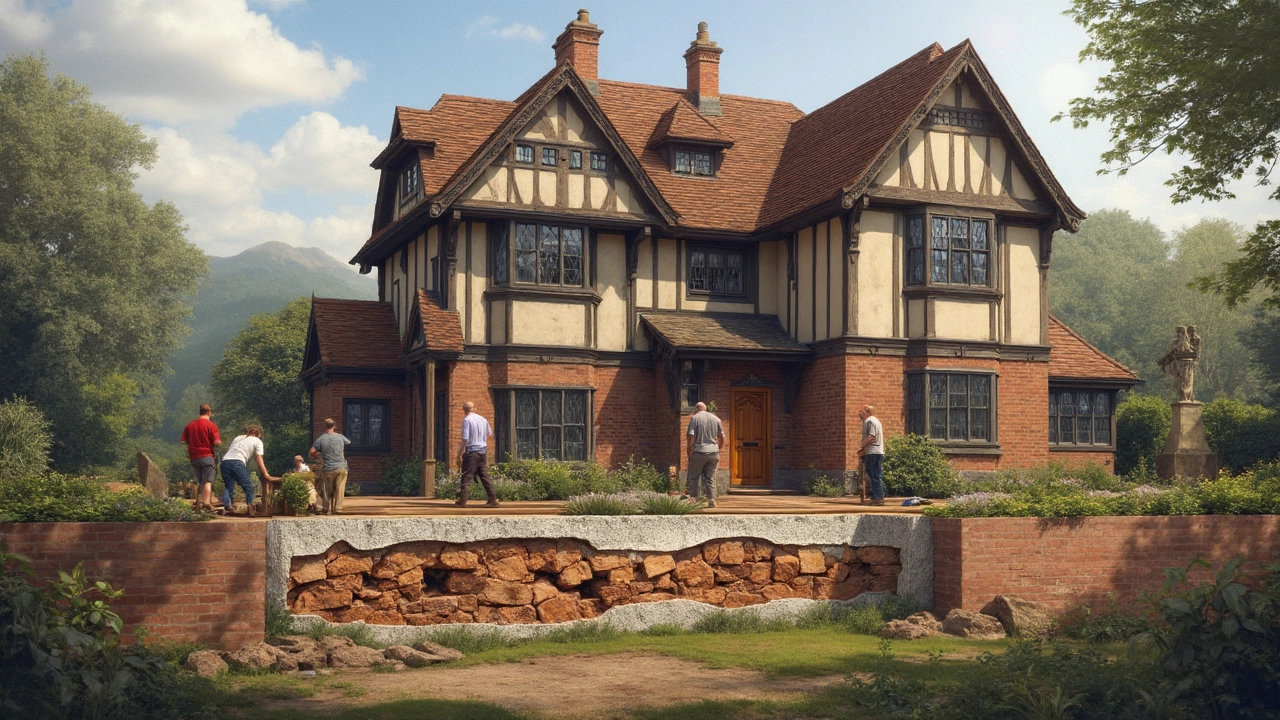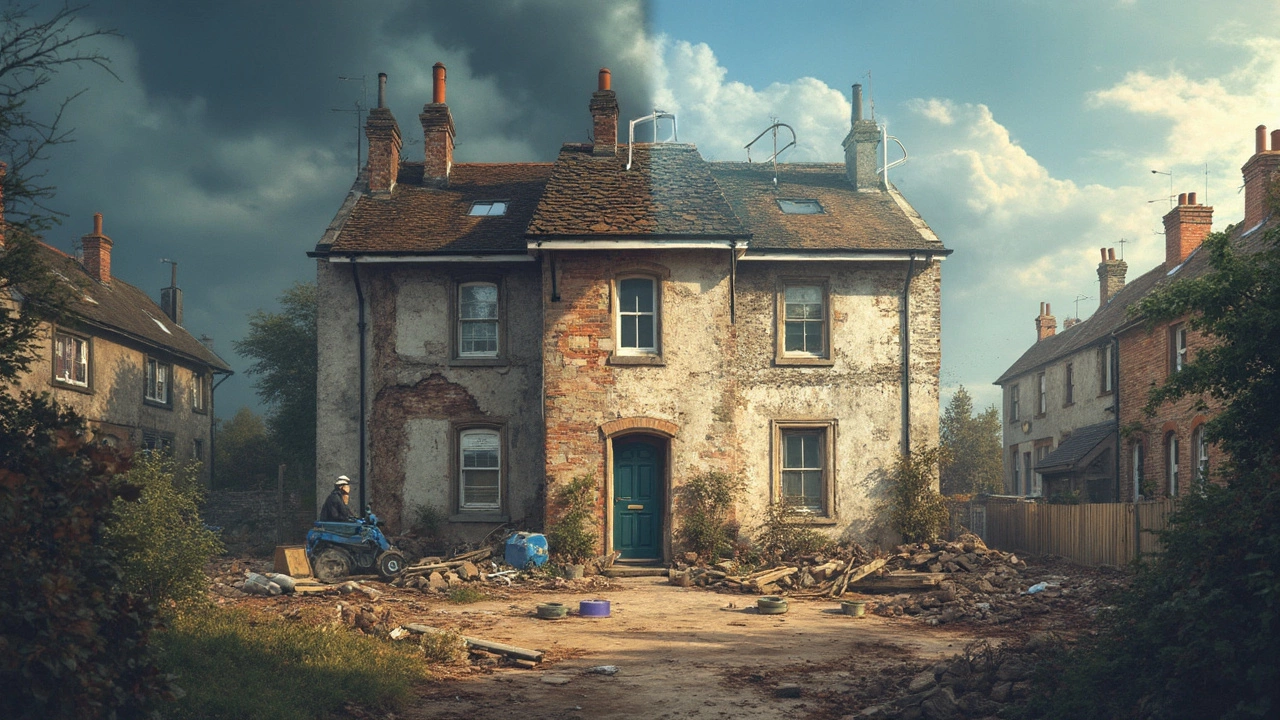The Most Expensive Fix in Your House: What to Expect
 Apr, 3 2025
Apr, 3 2025
Ever wondered what's the one thing you should cross your fingers never needs fixing in your house? If you guessed the foundation, ding-ding—you’ve hit the jackpot. Foundation repairs aren't just a drain on your budget; they can be a homeowner's worst nightmare due to the complexity and scope of work involved.
So, why are these repairs so darn expensive? First off, they usually require a deep dive—literally—into digging around your home, assessing the damage, and then concocting a plan that's not exactly a quick 'n' easy fix. Think jacks, piers, and sometimes, trench warfare against soil and concrete. The nitty-gritty can add up to tens of thousands of dollars, even more if the damage is severe.
If you want to sleep easy, understanding the warning signs of foundation trouble can be a game changer. Cracks in walls, doors that just won't close right, or that subtle shifting feeling like your house is slowly leaning to one side—these might mean it's time for a professional check-up. Catching these early could save you a heap of money down the road.
- Why Foundation Repairs Are So Costly
- Common Signs Your Foundation Needs Fixing
- Preventive Measures to Avoid High Costs
- How to Budget for Major Home Repairs
- Expert Tips on Choosing the Right Professional
Why Foundation Repairs Are So Costly
Alright, so you might be wondering why fixing a foundation often feels like burning a hole in your wallet. Well, here’s the scoop: when it comes to home renovation, fixing a foundation is right up there with buying a car—without the fun part of driving it.
First thing's first, the complexity of the job is no joke. You’re looking at engineers, inspectors, specialized contractors, and sometimes even geotechnical experts getting involved. It's like putting together a dream team of superhero construction workers. Why? Because the success of the repair depends on a custom solution every time. The soil type, house weight, and existing damage all play a role.
“Foundation repairs are pricey because they often require a blend of art and science. Each project is a new puzzle,” says Emily Tran, a veteran structural engineer.
Then, there's the equipment—jacks, piers, concrete mixers, and sometimes heavy machinery for excavation. These aren't your usual hammer-and-nail jobs. Plus, let's not forget the raw materials. Quality materials like steel and concrete aren't cheap, especially when you're using them to hold up something as heavy and important as your house.
Labor is another biggie. Digging under your house or shoring up a sinking corner isn’t a one-person gig; it takes a skilled crew. Skilled labor doesn’t come cheap, and when you add up the hours needed, it starts to make sense why your wallet might cry a little.
Here's a quick breakdown of some typical costs that can come with foundation repairs.
| Repair Method | Average Cost |
|---|---|
| Concrete Slab | $2,500 - $6,000 |
| Steel Piers | $1,000 - $3,000 per pier |
| Helical Piers | $1,400 - $2,100 per pier |
| Sealing Cracks | $500 - $1,000 |
So, while it might sting at first, investing in a good foundation repair is crucial. It not only stops the house from sinking into a black hole of despair but also ensures the place you call home remains safe and sound. Spending the big bucks now can save you from massive headaches—and costs—later.
Common Signs Your Foundation Needs Fixing
Suspecting issues in your home’s foundation might give you the jitters, but spotting signs early can seriously cut down on repair costs. Here's what you need to look out for to catch those issues before they become a homeowner's horror story.
Start with the walls. If you notice cracks, both vertical and horizontal, it might be more than just settling. Bigger or growing cracks can signal shifting in your foundation, something you definitely want checked.
Next on your list should be doors and windows. If they're suddenly jamming, swinging open by themselves, or if the frames look a bit slanted, that's the house trying to tell you something. Uneven floors are another big hint you shouldn't ignore. If a marble rumbles away from you when you put it on the floor, you might have leveling issues.
Outside your house, take a peak at any separation between bricks or a tilting chimney. These hints are like the house’s red flags, screaming for attention. Even things like pooling water near your foundation after a rain can be an indicator of drainage issues affecting the stability of the house.
Finally, your basement holds clues, too. Watch for any water spots or cracks in the concrete. If things seem off down there, it’s a sign your foundation might need a little love.
- Cracks in walls (vertical or horizontal)
- Doors/windows not closing properly
- Uneven or sloping floors
- Gaps between bricks on the exterior
- Water pooling near the foundation
- Basement water spots or cracks
Checking on these can seem like a chore, but trust me, ignoring them could cost you far more than the hassle of fixing them early. A little effort now could save a mountain of stress—and cash—later.

Preventive Measures to Avoid High Costs
Alright, let's talk about keeping a lid on those pesky home renovation costs. No one’s got time or money for monster-sized repairs if they can be avoided, right? So, here’s the scoop on how you can keep your foundation in check and prevent those expensive repairs.
First off, pay attention to drainage around your house. Proper drainage means keeping water far away from your foundation, which helps a ton in avoiding shifting or cracking. Gutters are your home's unsung heroes, so make sure they’re free of clogs and effectively channeling water away.
- Gutter Maintenance: Clean gutters at least twice a year to avoid blockages.
- Downspout Adjustment: Ensure downspouts extend at least 5 feet from your home.
Next up, soil moisture plays a crucial role. The goal is to keep the soil around your home evenly moist. During hot months, when the soil shrinks, a simple DIY trick is to use a soaker hose lightly to maintain balanced moisture levels.
- Use Soaker Hoses: Run around the foundation to keep the soil consistently damp.
Trees and roots can be sneaky. If you've got large trees close by, consider moving them or installing root barriers. Their roots can mess with your foundation over time.
Also, don't forget regular foundation inspections. Clues like tiny wall cracks or a slightly uneven floor can be early indicators that something's brewing underground. Catch these problems early and have a professional take a look.
- Regular Inspections: Walk around your home quarterly to check for signs of trouble.
Implementing these simple steps could save you big bucks and prevent a headache down the line, keeping your house maintenance in the “manageable” zone. It’s all about being vigilant and proactive.
How to Budget for Major Home Repairs
Tackling major home renovation projects can be stressful, especially when they sneak up on your budget. But don't worry, planning and prepping can spare you from a financial meltdown. Here’s how you can keep a cool head and a healthy wallet:
First off, the golden rule: Don't wait until disaster strikes to think about repairs. Establish an emergency fund specifically for unexpected house maintenance. Experts suggest saving at least 1-3% of your home's value each year to build a stash for these rainy days.
Let’s break it down:
- Set Up an Emergency Fund: If your home’s worth $300,000, aim to save $3,000 to $9,000 annually just for potential repairs.
- Keep an Eye on Regular Maintenance: Regular check-ups can catch small issues before they balloon into big, costly headaches.
- Get Multiple Quotes: Never settle for the first contractor who gives you a quote. Compare at least three estimates to make sure you're getting a fair deal.
- Prioritize Key Repairs: If you’ve got a hit list of things to fix, tackle the most crucial ones first, like foundation repairs, to prevent things from getting worse.
Now, here's something surprising — according to a 2024 survey by Remodel Magazine, the average cost for major repairs in U.S. homes when not planned can soar beyond $15,000! Having a budget set aside specifically for emergencies is crucial to prevent these costs from becoming a heavy burden.
| Suggested Budget by Home Value | |
|---|---|
| Home Value | Annual Savings Goal |
| $200,000 | $2,000 - $6,000 |
| $300,000 | $3,000 - $9,000 |
| $400,000 | $4,000 - $12,000 |
Also, it’s wise to have a little cushiony buffer beyond your estimated costs. Stuff happens—everything from unexpected permits to those little 'extras' that always seem to pop up during a renovation.
By being proactive and following these steps, you’ll be in a much better spot to handle whatever your house decides to throw your way. Remember, a little prep now can save a lot of headaches—and dollars—later.

Expert Tips on Choosing the Right Professional
So, you’ve got this monster task of fixing your foundation, and you’re wondering who gets to play hero. Selecting the right expert is all about doing your homework. Here's what you should keep in mind.
First up, look for credentials. Does the contractor have the appropriate licenses? In most states, foundation repair companies need a general contractor’s license. But don’t just stop there. Check if they're a part of professional organizations, like the National Association of Waterproofing and Structural Repair Contractors (NAWSRC). This can add a layer of trust.
Ask if they offer structural warranties—it's like getting a safety net. Expensive repairs like these need more than just good work; they need guarantees that it’ll hold up. Usually, warranties range from five to twenty years. The longer, the better.
Dive into online reviews to get a sense of their reputation. Check out sites like Yelp or Angie's List, and don’t shy away from asking for references. A good contractor will have happy customers ready to vouch for them.
When you’re down to a shortlist, compare quotes. But remember, the lowest price isn’t always the best deal. Sometimes it’s worth shelling out a tad more for quality. Ask for an itemized list to see where each penny is going.
A visit in person speaks volumes. A reputable contractor will take time to understand your home’s specific needs. A quick chat can often give you gut feelings about whether they’re right for the job.
Lastly, be wary of those pushing fast solutions. Genuine house maintenance requires a detailed approach. Anyone promising to fix it fast may not be addressing all underlying issues, setting you up for future headaches.
Budgeting and planning for these repairs can save you from unexpected surprises. If you follow these tips, finding the right pro to fix up your home renovation needs won't be as daunting as it seems.
